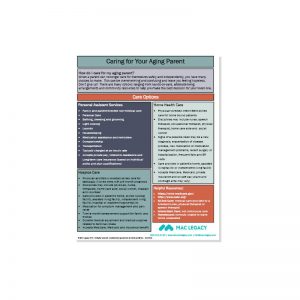Caring for your aging parent or family member can be a difficult task on its own but with an added Public Health Emergency (PHE) and COVID-19, there are additional struggles. If you are finding yourself in this position, consider the following helpful tips as a caregiver during this time.
| Keeping Your Aging Parent Safe: As the COVID-19 vaccine is available for those in higher risk categories, help your aging parent or family member get on a waiting list. If concerns arise about them taking the vaccine, contact their physician for approval. Limit visitors coming in direct contact with those you are caring for–only those who are absolutely essential in their care. Identify any fall hazards or areas in the home that could be potentially harmful. Removing a rug that could be a potential tripping hazard or adding a bar in the tub to allow the patient to safely get in and out could reduce the risk of hospitalization – keeping your family safe from the potential risk of COVID-19 Educate Yourself on their Health Benefits and Care Providers: Your first step as the patient advocate is to educate yourself on their health benefits and health care providers. Find out if there are any supplemental benefit plans that your family member might purchase so you have all the tools at your fingertips to help coordinate their care. Advancing age typically means increased health concerns and additional health specialists. Identify each specialist, gather phone numbers for each and make sure you are authorized to communicate about the patient’s health. Accompany your loved one at their next appointment so you can hear the details of their care. Set up virtual visits with the provider if they are not allowing guests or caregivers to be present in person. Educate yourself on the health concerns for your aging parent or family. Be prepared for their next visit with their doctor and have your questions ready. Being a patient advocate isn’t always an easy road to navigate, but preparing yourself can give you the advantage of knowing what to anticipate ahead of time. Ask about services your loved one might qualify for such as home health, personal assistance services or hospice. Know their wishes ahead of time. If your loved one has a DNR or Medical Power of Attorney in place, ensure you have copies available to share with health professionals. Let Technology Work for You: During a time of social distancing, technology has been a tool to alleviate burdens. Many elderly individuals need help navigating technology and understanding what tools are available for them and its benefits. Grocery Orders and Delivery: Many grocery stores and pharmacies now offer online orders with pick up and delivery options. This is extremely beneficial for those caring for others but also allows seniors to have the independence of ordering their own groceries and selecting delivery if available. Walk them through the steps of how the grocery orders can be mad. Bookmark or make those websites as “favorites” to assist their ability to find them. Help them save their login information so it’s easy to find the next time they need to login. Pharmacy Orders – Find a pharmacy that provides delivery and set up automatic refills. Develop a schedule of what medication is needed and when follow-up appointments are needed so to ensure their medication refills never run out. Virtual Communications– social distancing doesn’t have to limit family and friend’s communication. Help those that you are caring for set up their phones or tablets so that family members can participate in FaceTime, Zoom or Google Hangout with loved ones. This gives them the ability to participate in birthday parties, weddings, and other memories they might otherwise miss. Find Support for Yourself: Often caregivers fall into the “sandwich generation”. The sandwich generation describes a group of people, often in their thirties or forties, who are responsible for bringing up their own children and for the care of their aging parent. Discuss plans with family and friends to ensure your aging parent will be cared for if you were to become sick with COVID-19. If your loved one is needing professional health care, there are options that allow them to get the level of care they need while remaining in their home. Look for support services such as personal assistance services, home health or hospice that can help provide care. Have family, friends, a pastor, or counselor you can meet with to help you maintain your own well-being and mental health. Taking care of yourself is important when caring for someone else. Support: Caring for your Aging Parent – Cheat Sheet Infection Control & COVID-19 Patient Teaching Tool – Digital Download References: https://www.aarp.org/ https://www.cdc.gov/coronavirus/2019-ncov/need-extra-precautions/older-adults.html https://en.wikipedia.org/wiki/Sandwich_generation |

